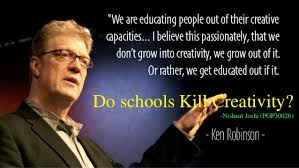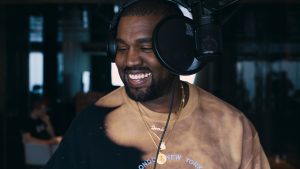Do schools kill creativity

Sir Ken Robinson makes an entertaining and profoundly moving case for creating an education system that nurtures (rather than undermines) creativity.
Sir Ken Robinson was giving a speech on the gaps in our educational system, the importance of creativity and the multiple types of intelligence which have to be considered. He pleads for a radical rethink of our school system.
Robinson starts his talk by raising awareness of the fact that children which start school now will retire approximately in 2065. Therefore it would be a teacher’s function to educate them with regard to the unpredictability of future events.
He states that creativity is as important as literacy and that, further, all children are talented and not afraid to be wrong. Mistakes should not be stigmatized but rather be seen as part of the learning process. Thus, “if you are not prepared to be wrong, you will never come up with something original”.
Robinson claims that every education system on earth would have the same hierarchy of subjects: Mathematics and languages are rated higher than humanities, and to the humanities is given more importance than to the arts. Within the arts there would be a further gradation: Art and music are higher rated than drama and dance. According to Robinson, the result of an education focused on the children’s heads rather than their bodies, leads to a system whose ultimate goal it is to form university professors.
As Robinson explains, this system was built to meet the needs of industrialism and is therefore based on two main ideas: On the one hand it is based on the value of a person for the system, i.e. “the most useful subjects for work are at the top” and it would not be an option to become e.g. a musician. And on the other hand, it is based on his or her “academic ability”; since, by many, intelligence is linked with the latter, we have a limited view on intelligence and in it’s consequence many highly-talented, brilliant people who do not fit in the system do not realize that they are.
In the following Robinson sums up serious problems which we will face in the future: Firstly, according to UNESCO, in the next 30 years more people world wide will be graduating through education than ever before. Secondly, the technological progress leads to the substitution of work so far performed by humans. Thirdly, there will be an explosion in population. This will lead to a “process of academic inflation”: degrees are devaluated and job perspectives subside.
Robinson says that we need to rethink the way we see intelligence: it is diverse ( we think visually, kinaesthetically, in movement etc.), it is dynamic (having original ideas often “comes about through the interaction of different disciplinary ways of seeing things”) and it is distinct. For the latter he cites the example of Gillian Lynne, a famous choreographer who was almost diagnosed with a learning disorder as a child due to her inability to sit still in class.
In the end, Robinson appeals to all of us to see “our creative capacities for the richness they are” and to help build an educational system that supports rather than undermines creativity.
The talk is interesting for everybody who is interested in education or will be working or is working in the educational sector. Further it should be interesting for politicians who are the ones who can bring about changes to the law. Ultimately the talk is interesting for everybody due to the fact that every person on earth should have access to good and supporting education.






